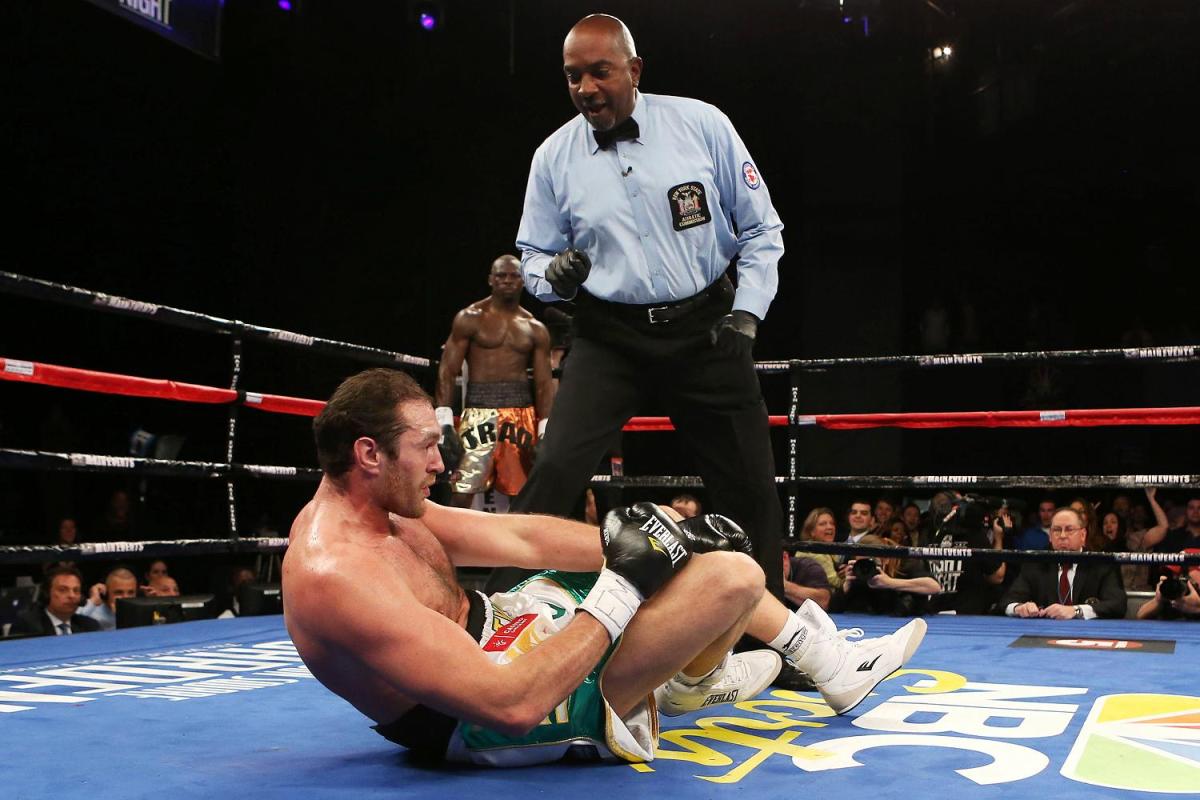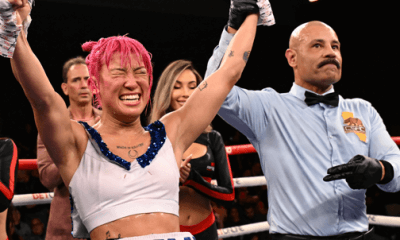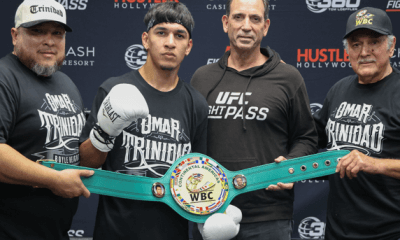Featured Articles
Steve Cunningham, Who Almost Kayoed Tyson Fury, Believes Wilder Will Do It

If you want to call Tyson Fury’s style “Greco-Roman boxing,” that’s probably as good a description as any. Like most exceptionally large heavyweights who dwarf smaller opponents with significant advantages in height, weight and reach, an important element in Fury’s standard fight plan is to initiate multiple clinches, to lean on those figurative Lilliputians until their strength saps and, gasping, they become increasingly vulnerable to standard boxing tactics in the later rounds.
Hey, if it worked for the even more gigantic but far clumsier Nikolai Valuev (50-2, 34 KOs), a two-time WBA heavyweight champion, why shouldn’t it work for the 6-foot-9, 255-pound Fury (27-0, 19 KOs) when the former unified titlist challenges WBC heavyweight champion Deontay Wilder (40-0, 39 KOs) on Dec. 1 at the Staples Center in Los Angeles? At 6’7” Wilder is almost tall enough to look Fury straight in the eye, and his impressive 83-inch reach is nearly a match for Fury’s 85-inch tentacles. But Wilder, who was comparatively lean even at his heaviest-ever official ring weight of 229 pounds, came in at an almost-skinny 214¾ for his most recent defense, in which he had to fight through several scary moments before stopping Luis “King Kong” Ortiz, who outweighed him by 26½ pounds, in the 10th round on March 3 at Brooklyn’s Barclays Center. The differential in heft will be even more pronounced should the free-swinging Wilder find himself wrapped up time and again in Fury’s tactical bear hugs.
But two-time former cruiserweight champion Steve “USS” Cunningham, maybe more than anyone, understands that Fury’s strengths can be at least somewhat negated by the sort of advantages Wilder, an opening-line minus-160 favorite, holds over his hulking rival. Some of Wilder’s attributes are reasonably similar to those of Cunningham, who dropped and hurt Fury in the second round (that’s Fury on the seat of his pants) before being stopped himself in the seventh round of their April 20, 2013, bout at the Theater at Madison Square Garden. But Wilder hits a hell of a lot harder than Cunningham, which is the main reason why Cunningham is picking the Alabamian to finish the demolition job he might have shockingly pulled off 5½ years earlier had he been able to connect with just the right follow-up shot to a clearly buzzed Fury.
“In my fight with Fury, he totally underestimated me and we capitalized on that,” said the 42-year-old Cunningham, who has since dropped back down to cruiserweight and is still presumably active, although he has not fought since losing a 10-round unanimous decision to Andrew Tabiti on Aug. 26, 2017. “I was able to catch him when he was goofing off and playing. Even after he got up and got serious, I was still able to catch him coming in. I’d maneuver to put myself in a better spot to do that.
“So we know Fury can get knocked down with a big shot. I’ve done it.”
He did it despite not being known as a big hitter, but massive power is and has always has been Wilder’s calling card. With a knockout percentage of 97.5 that almost looks like a typographical error, Wilder, the super heavyweight bronze medalist for the United States at the 2008 Beijing Olympics, never goes into any bout expecting it to go the distance. If he hits Fury with the same sort of shot that Cunningham did, it’s a good bet that the big, burly Briton won’t beat the count, and even if he does he might not be able to recover from it as quickly as he did against Cunningham.
“With Fury fighting Wilder, I can’t go against Wilder,” Cunningham said. “I can’t really go against Wilder against any of the top heavyweights, including Anthony Joshua. Why? Because Wilder has that great equalizer, a sledgehammer of a right hand. We all know that once that right hand lands – and it’s going to land at some point in a 12-round fight – the outcome is pretty much a done deal.”
But what about Fury’s frequent clinches, which not only can fatigue the other guy, but frustrate him as well?
“I don’t see Fury’s weight being an issue because Wilder has good movement and he can box better than a lot of people think,” Cunningham continued. “Yeah, I know Deontay can look a little goofy and undisciplined at times, but he hasn’t been made to look like the boxer he’s capable of being. We’ve seen glimpses of it here and there, but he’d probably have to show more of that against Fury until the opening comes to him to deliver that great equalizer. No matter how I size it up, I see Wilder stopping Fury with that right hand. He keeps launching it and launching it and launching it until the big one connects.”
Fury has a back story – uh, make that stories – that has probably made him more recognizable and marketable than his relatively unexciting, albeit victorious, performances merit. He was a preemie as an infant, coming into this world at a little over a pound, making for exceedingly long odds of his even making it to childhood, much less filling out to his current gargantuan dimensions. There is the burden of his being an Irish Traveller, a group that is widely reviled in the United Kingdom but nonetheless holds a certain fascination to the public. And if all that weren’t enough, there is the epic cocaine-and-eating binges that he went on, and now has come back from, after he stunned the boxing world by outpointing long-reigning and lineal champion Wladimir Klitschko on Nov. 28, 2015, in Dusseldorf, Germany. A serial utterer of coarse and controversial quotes who fancies himself a better singer than fighter, Fury is a media darling right up to the time the bell rings and his crackling pre-fight wattage generates less electricity inside the ropes.
But it is a mistake to lump Fury, whose dad named him after Mike Tyson, with the robotic, lumbering and monosyllabic Valuev. He does have a skill set, and one that extends beyond his array of wrestling moves.
“Size doesn’t equate to boxing ability,” said Cunningham, who was up 57-55 on two of the official scorecards and even 56-56 on the other at the time he was knocked out by Fury. “It also doesn’t equate to punching power, not really. To Fury’s credit, he’s pretty athletic for such a big guy and he comes in shape, or at least he did when I was in camp with him (as a sparring partner) and fought him later on. He had a rowing machine and he rowed on it like a maniac. He did other things that were kind of unique. I remember thinking, `Wow, this guy does have a good engine in him,’ so he was capable of going a lot of rounds. If you don’t get him out of there early, he will use that size to wear you down. Because of that, the only two current heavyweights I see who are capable of knocking him out are Wilder and Joshua.
“Him being so much bigger than most of the guys he fights, I’d be lying if I said it doesn’t take a toll on you. Guys who fight Fury now, or who fought Valuev then, would train to be able to better cope with the wrestling and the holding. They’d train to not get in those type situations as often. Before I fought him, I knew Fury liked to lay on opponents. I sparred with big guys in camp for four or five weeks, but they weren’t that big and I just wasn’t able get anybody to really replicate him.
“My plan was to use my legs as much as possible to stay away from him, but I was coming off my second fight with Tomasz Adamek in which I felt I had done enough to easily win on points (Cunningham lost a disputed split decision). So you get it in your mind that, hey, maybe I should just try to knock (Fury) out instead.
“I had my chance. Wilder, I believe, will get his chance as well. Will he put the giant down and out? That’s my pick. But we won’t find out until fight night, will we?”
Bernard Fernandez is the retired boxing writer for the Philadelphia Daily News. He is a five-term former president of the Boxing Writers Association of America, an inductee into the Pennsylvania, New Jersey and Atlantic City Boxing Halls of Fame and the recipient of the Nat Fleischer Award for Excellence in Boxing Journalism and the Barney Nagler Award for Long and Meritorious Service to Boxing.
Check out more boxing news on video at The Boxing Channel
-

 Featured Articles3 weeks ago
Featured Articles3 weeks agoThe Hauser Report: Zayas-Garcia, Pacquiao, Usyk, and the NYSAC
-

 Featured Articles2 weeks ago
Featured Articles2 weeks agoOscar Duarte and Regis Prograis Prevail on an Action-Packed Fight Card in Chicago
-

 Featured Articles1 week ago
Featured Articles1 week agoThe Hauser Report: Cinematic and Literary Notes
-

 Book Review5 days ago
Book Review5 days agoMark Kriegel’s New Book About Mike Tyson is a Must-Read
-

 Featured Articles4 weeks ago
Featured Articles4 weeks agoManny Pacquiao and Mario Barrios Fight to a Draw; Fundora stops Tim Tszyu
-

 Featured Articles4 weeks ago
Featured Articles4 weeks agoArne’s Almanac: Pacquiao-Barrios Redux
-

 Featured Articles3 weeks ago
Featured Articles3 weeks agoRemembering Dwight Muhammad Qawi (1953-2025) and his Triumphant Return to Prison
-

 Featured Articles4 weeks ago
Featured Articles4 weeks agoOleksandr Usyk Continues to Amaze; KOs Daniel Dubois in 5 One-Sided Rounds


















